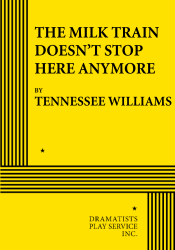The Milk Train Doesn't Stop Here Anymore

THE STORY: As George Oppenheimer describes “We first encounter Mrs. Goforth in one of her three villas on the southern coast of Italy frantically endeavoring to complete her memoirs before her death. However, there is still life in the old girl as she bullies her attractive female secretary, spits venom at a visitor whom she dubs “the witch of Capri,” makes propositions to a handsome young itinerant poet over half her age, and dictates night and day, either to the secretary or to any number of tape recorders scattered about the premises, her vapid and ridiculous memories which she believes will form an important social commentary… To the triple homes of Mrs. Goforth comes Chris Flanders, the young poet, who because of his past presence in the company of so many elderly women at the time of their deaths has won the mocking nickname of “the angel of death.” At first we take him to be, as does Mrs. Goforth, a hustler who is willing to sell his poems, his mobiles, or his body to susceptible and lonely ancients. To Mrs. Goforth, who has lived a full and promiscuous life and is in mortal fear of relinquishing it, Chris comes as an answer to a carnal prayer, a last fling before she is forced to face ultimate loneliness. Then she discovers that he is unwilling to give in to her seductions at any price, that his is a spiritual nature which seeks only to allay her fears and soothe her pain. Until almost the very end she refuses to believe in his virtue. Her life has been so hedged in viciousness that she cannot accept readily anything but venality."
NOTE: The version of the play contained in this acting edition is one which was specifically revised by the author for release to the nonprofessional theatre.
A powerful study of an aging and dissolute woman, whose excesses have robbed her of the ability to accept, or even comprehend, the proffered redemption embodied in the young poet who appears at her villa.
“Tennessee Williams’ most arresting drama…” —New York Daily News.
“Fascinating tragi-comedy.” —New York Mirror.
“Tennessee Williams is to me our greatest living playwright.” —Newsday (NY).
